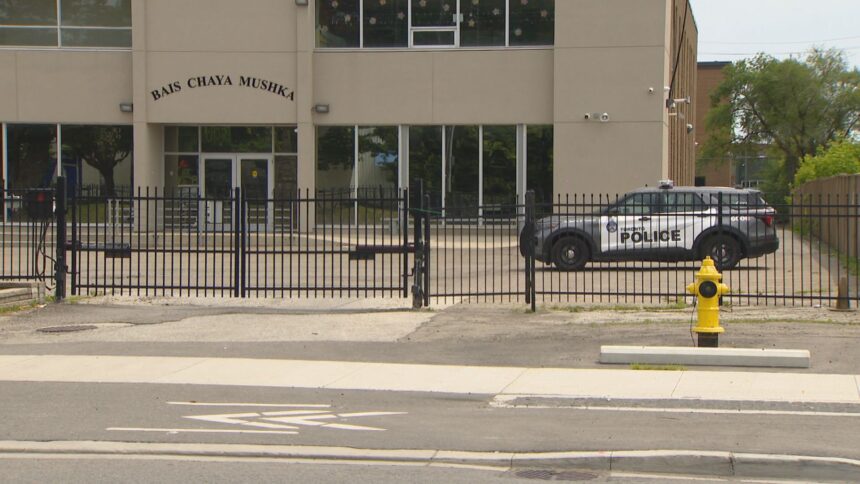As I walk through Toronto’s neighborhoods this week, there’s an unmistakable shift in the atmosphere around our city’s diverse places of worship. Police cruisers circle synagogues more frequently, officers stand vigilant outside mosques during prayer times, and security personnel conduct more thorough bag checks at community centers.
“We’ve increased our visible presence at all religious institutions across the Greater Toronto Area,” confirms Toronto Police Superintendent Pauline Gray during yesterday’s media briefing. “This is a proactive measure to ensure everyone feels safe practicing their faith during this difficult time.”
The heightened security follows escalating tensions in the Middle East that have tragically rippled into our local communities. Just last weekend, the Beth Shalom Synagogue in North York reported concerning graffiti on its exterior walls, while the Al-Taqwa Islamic Center received threatening phone calls.
Rabbi David Goldstein of Beth Shalom tells me these security measures bring mixed emotions. “We’re grateful for the protection, but saddened it’s necessary,” he says, adjusting his kippah as we speak outside his synagogue where a police cruiser idles nearby. “Our congregation includes Holocaust survivors. Seeing police stationed outside religious buildings stirs difficult memories.”
The York Regional Police have deployed specialized units to houses of worship throughout Vaughan, Richmond Hill, and Markham – areas with significant Jewish and Muslim populations. Their Community Engagement Unit has been conducting daily check-ins with religious leaders.
“We’re taking no chances,” says YRP Constable Wei Chen. “Our officers have received additional training on recognizing and responding to hate-motivated incidents.” Chen notes that reported hate crimes in the GTA have increased 37% compared to this time last year, according to preliminary police data.
At the Islamic Society of Toronto, Friday prayers now include security briefings. Imam Hassan Mahmood shares that attendance initially dropped when tensions flared overseas, but community members are gradually returning. “The visible police presence helps, but we’re also training our own volunteers in basic security protocols,” Mahmood explains.
The increased protection extends beyond Jewish and Muslim communities. Sikh gurdwaras, Hindu temples, and churches serving Middle Eastern Christians have all seen enhanced security measures.
Toronto’s Interfaith Council has been instrumental in coordinating response efforts. Their emergency meeting last Tuesday brought together leaders from eight faith traditions to develop a unified approach. Council Chair Reverend Diane Jackson emphasizes that “division is exactly what extremists want. We’re determined to stand together.”
Walking through Thorncliffe Park, I notice community members taking matters into their own hands too. Outside the neighborhood’s main mosque, young volunteers in neon vests patrol the perimeter during prayer times. Faisal Qadir, 22, tells me he joined the volunteer security team three weeks ago. “My mother was nervous about attending prayers,” he says. “Now I come early to help make everyone feel safer.”
The financial cost of these security measures is substantial. The federal government recently announced a $3.5 million emergency fund to help religious institutions enhance security systems. However, Toronto City Councillor Anthony Perruzza believes more is needed. “Some smaller congregations are struggling to afford basic security equipment like cameras and alarm systems,” he notes during our phone conversation.
While police presence offers reassurance, community leaders emphasize that lasting security comes through education and solidarity. The Toronto District School Board has implemented additional anti-hate curriculum resources, and interfaith groups have organized joint prayer services.
Dr. Samantha Lee, who researches religious conflict at the University of Toronto, provides context: “What we’re seeing in Toronto mirrors global patterns. When international conflicts intensify, local communities often experience the fallout. The key is building resilience through cross-community relationships before crises occur.”
As my reporting takes me across the city, I’m struck by both concern and courage. Outside the Beth Sholom synagogue, I watch as a Muslim family delivers flowers to Rabbi Goldstein – a small gesture of solidarity that speaks volumes.
“This is the Toronto we know,” Goldstein says, embracing Mohammed Khalil, who brought the flowers with his two children. “We refuse to import hatred from overseas.”
Police officials indicate the enhanced security measures will remain in place for the foreseeable future, with tactical adjustments based on ongoing risk assessments. For worshippers across Toronto, this new normal involves additional planning – arriving earlier to accommodate security checks and staying vigilant.
As the sun sets over the city, I observe a group of interfaith leaders standing together outside City Hall, their different religious garments creating a tapestry of tradition. They’re planning a citywide peace walk for next weekend – a testament to Toronto’s resilience in the face of global tensions.
In times of uncertainty, our city’s diverse faith communities are demonstrating that solidarity can be our strongest security measure.







